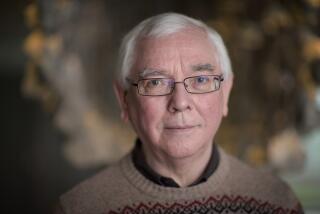Like the Thames, It’s Murky Yet Picturesque
- Share via
Remember when Brit-suckled “Masterpiece Theatre” was not only the big, bold, looping signature of PBS but a true event that regularly earned your admiration? Well, start waving those Union Jacks.
Happy nights are here again.
For nostalgia-niks with fond memories of “Masterpiece Theatre” of old comes a grand Dickensian hoot as dark and sludgy as the Thames that twists through its six hours of nightmares and night crawlers.
The last, least-known of Charles Dickens’ novels, “Our Mutual Friend” opens on PBS Sunday night with the serpentine river yielding a corpse said to be John Harmon, heir to a large fortune. The circumstances, it’s whispered in some circles, are “highly suspicious.”
A clue: Follow the money.
Nearly everyone in this highly seductive, atmospheric tale of Victorian crime, romance and manners has a nose for cash, from the decadent society blowhards sniffing and harrumphing in their elegant salons to the ratty, snarly boatmen who earn what they can by fishing the Thames for bodies in the inky darkness. Bodies of murder, suicide and accident victims they can loot and sell.
If this were Los Angeles in 1999, TV crews would land here faster than you could say “Live at 11,” making light shows of rotting corpses dragged from putrid waters. Instead, it’s London in the early 1860s that concerns this Dickens adaptation, where sounds initially come only from distant voices on the river and oars cutting through an evening waterscape so heavy with gloom that it seems the sun will never shine. It does, happily, and “Our Mutual Friend” not only brightens from time to time but is quite droll at the edges.
Equally prominent, though, are hills of polluting rubbish, known then as dust mounds, from which recycling barons like mysterious John Harmon’s dead father earned enormous wealth. Asthmatics beware. With Julian Farino directing, the sensory impact is acrid, and just watching the poor scramble across these gaseous dust yards can clog pores and bring on wheezing.
A smelly business, obviously, but one that joins the Thames in becoming an unlikely catalyst for parallel love stories--essentially a pair of guys chasing a pair of babes--threaded by violence, greed and the class tensions and inequities so omnipresent in Dickens.
One romance is driven by secretive, watchful John Rokesmith (Steven Mackintosh), penniless secretary to a sweet working-class couple, Mr. and Mrs. Boffin (Peter Vaughan and Pam Ferris), who are living in splendor after somehow acquiring the inheritance meant for young Harmon. Rokesmith is smitten and stirred in all the right places by the Boffins’ unofficial ward, smashing Bella Wilfer (Anna Friel), but she would prefer a beau bearing gold dust. Bella’s prominence is not incidental, and here is where the complex plot muddies. It seems that the older Harmon’s will required his son to marry Bella to get his inheritance. But--go figure--young Harmon and Bella had never met.
The second romance concerns Lizzie Hexam (Keeley Hawes), lovely daughter of the corpse thief who plucked from the river a body identified as John Harmon. Pursuing earnest Lizzie, with not always the noblest of motives, is Eugene Wrayburn (Paul McGann), an attorney who believes her possibly too lowborn for someone as highborn as he. But his loins send a different message when her luminous smile cuts through the urban grime like a laser.
Entering ominously in the second of these three episodes is Bradley Headstone (David Morrissey), a menacing, hulking bruiser of a schoolmaster who is also obsessed with Lizzie, but ferociously hates Wrayburn and is utterly mad. Do you hear? MAD!!!
“Our Mutual Friend” was adapted for TV by Sandy Welch, whose earlier teleplay for Barbara Vine’s “A Dark Adapted Eye” affirmed her dexterity at unknotting intricate crime themes. Her “Our Mutual Friend” is a sort of Dickens noir with extreme violence following memorable comeuppances and final accountings in a tense, shadowy third episode.
As always, though, Dickens remains a social critic whose romantic heart is matched by a shrewd eye for contrasts. Early in “Mutual Friend,” for example, London’s poor huddle in darkness over coal fires as a coach passes carrying two aristocratic gentlemen in evening clothes. He’s observant, too, of the destructive role riches can have, as in money seeming to go to Mr. Boffin’s head when he rages petulantly as his muffin of a wife sits quietly with her needlepoint. And we have also those snooty grifters the Lammles--Alfred and Sophronia--who wed early in the story, each mistakenly thinking the other moneyed, then devote their energies to conniving from the wings.
What is Dickens, too, without a potful of comically exotic names? In this case, the Boffins and deranged stalker Bradley Headstone joining Eugene’s friend Mortimer Lightwood, George Radfoot, the Veneerings, Rogue Riderhood and his daughter Pleasant Riderhood, those manged lowlifes Mr. Venus and peg-leg Silas Wegg and the wacky young man known only as Sloppy.
Not that “Our Mutual Friend” is more than occasionally lighthearted. While proceeding toward its ending, be mindful that the river that giveth also taketh.
* “Masterpiece Theatre: Our Mutual Friend” airs Sunday-Tuesday at 9 p.m. on KCET-TV.
More to Read
The complete guide to home viewing
Get Screen Gab for everything about the TV shows and streaming movies everyone’s talking about.
You may occasionally receive promotional content from the Los Angeles Times.






